Hitchcock and the trivialization of evil
Thirty-five years without Hitchcock. His films are chilling, not just because they show us evil unloosed into the world, but because that evil is so often banal and everyday, walking around on the streets of a town or a city just like ours.
02 JUNE 2015 · 16:48 CET
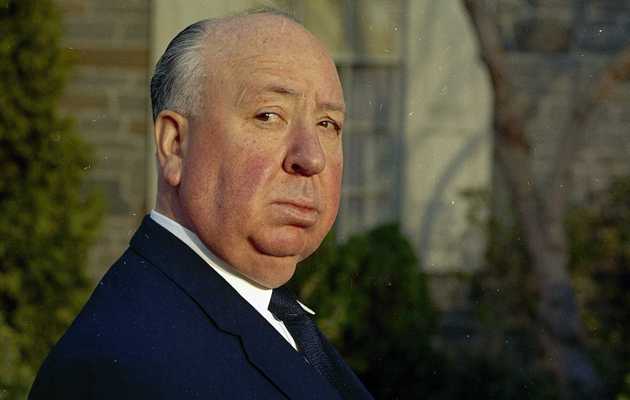
On 29 April 1980, Sir Alfred Hitchcock passed away in a wealthy district in Los Angeles. Now, 35 years after his death, we want to remember the figure of one of the greatest directors in cinematographic history, republishing this article by José de Segovia.
The film Hitchcock recreates the filming of Psicosis (1960) – on the subject of which various Spanish authors have now written a book, Regreso al Motel Bates (Bates Motel Revisited)–, while at the same time a television series talks about how he filmed The birds, and critics from around the world elected Vertigo as the best film in the history of cinema – instead of the usual Citizen Kane –. What does the “Master of Suspense” still have to throw at us?
Firstly, Hitchcock (1899-1980) is the first celebrity director in the history of cinema. Until then everyone went to see a film of a certain genre, because they liked a certain kind of story, or a famous actor or actress, but no one was interested in the name of the director. All of a sudden, people started saying that they were going to see “a Hitchcock”, as if his work was a genre unto itself.
He was given legendary status by the French critics of the 1950s, becoming the author of cinema par excellence. His book of conversations with François Truffaut continues to be the most republished book in cinematographic literatura. He is probably the only director who is admired in equal measure by film lovers and the public at large, having been recognized for his artistic talent and commercial value.
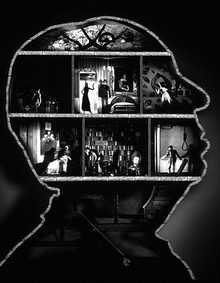
POST-WAR PSYCOSIS
In this film, we see Hitchcock in the 1950s. The post-war years not only brought McCarthy’s “witch hunt” to Hollywood – which cut short the career of many film-makers on suspicion of being communists–, but they also saw the appearance of the television. Television made Hitchcock very famous, as he presented and closed a programme which is worth more for those minutes than for the whole episode – normally directed by someone else–. It was in this context that were committed the crimes by the man considered by many as the first “serial killer”, Ed Gein (1906-1984). I will spare you the gory details, but killing those women was only the beginning of his necrophiliac perversion.
Gein’s case inspired Thomas Harris’ Hannibal Lecter, and the novel Psycho (1959) by Robert Bloch, which I have recently reread, in an old copy of my father’s – published in Barcelona in 1961 as Psycho, as part of a collection of detective stories–. The short and podgy forty-year old in the film, becomes the tall lanky Anthony Perkins in Hitchcock’s film – played by James D’Arcy, who has a striking resemblance to him–. Norman is clearly inspired by “The Butcher of Plainfield” – as Gein was known, because he had a farm in that part of Wisconsin, also home to the author–. His unhealthy relationship with his mother has now also inspired a new televisión series, Motel Bates.
In Bloch’s novel, Norman reads occultist books, which his mother disapproves of, such as Ouspensky or the father of modern Satanism, Aleister Crowley. His murders are explained in the book by his having been under the effects of alcohol, which isn’t given as much importance in the film. Furthermore, the psychologist’s final conclusions are contradicted by Hitchcock, who avoids all reductionism when considering the mystery of evil. For him, there is no doubt: “All men are potential murderers”.
BATES MOTEL REVISITED
The book edited by Planes Pedreño, containing various contributions on the film – published by the Jesuit publishers Mensajero de Bilbao –, coincides with the debut of the London Director, Sacha Gervasi. His film did not get very enthusiastic reviews, but I enjoyed it a lot. I thought that I wasn’t going to be able to accept Anthony Hopkins as Hitchcock, but he manages it, especially in the television presentations. Helen Mirren doesn’t look much like his wife Alma, but the whole film speaks of matrimonial complicity, which imagines itself on the brink of crisis due to Hitchcock’s jealously at his wife’s collaboration with the screenwriter Whitfield Cook, author of the unsuccessful Stage Fright (1950).
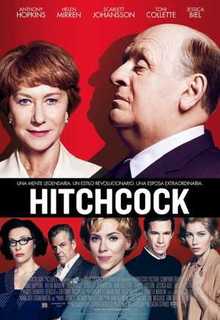
At a time when Hollywood seems open to independent productions, few people realise that this was not the case back in the 1960s. When Paramount Studios refused to finance Psycho, Hitchcock had to produce it himself by mortgaging his house.
After the success of North by Northwest (1959), some suggested that it was time for him to retire. His fear of becoming old-fashioned drove him to produce a terror film which was stood at the vanguard. For its launch, the “Master of Suspense” created a promotion campaign with the most surprising indications:
“My first instruction to Theater Owners: Hire Pinkerton guards to strictly enforce our unique admission policies. Furthermore, because Psycho is so terrifying and unique, the guards can help you deal with customers who run amok. Should [anyone] be so foolish as to attempt to slip in by a side entrance, a fire escape or through a skylight, [they] will be ejected by brute force. To further emphasize the sheer, unrelenting shock and suspense of Psycho, right after the closing title "THE END," we strongly recommend that you close your house curtains over the screen for a full thirty seconds. By doing so, the horror of Psycho will be indelibly etched in the mind and heart of your audience”.
¿MONSTER OR MORALIST?
Hitchcock’s biographers seem to be divided as to his personality. In 1983, a Catholic theologian called Donald Spoto – who likes to speculate on the dark side of famous people-–, published a sensationalist book in which he built up a horrible image of Hitchcock as a sadist monster, sex addict and a manipulative voyeur – presented by the series The Girl–. This goes against the view of French directors such as Truffaut, Rohmer or Chabrol, who saw him more as a moralist, a catholic film-maker. The most objective view is probably found in the monumental biography by Patrick McGilligan, which shows both his bright and dark sides. His vindication of Alma had a great influence on Stephen Rebello – whose book is the basis of Gervasi’s film, which is centred on his marriage–.
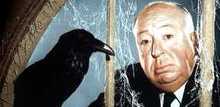
The best anecdote from Hitchcock’s childhood was told by his daughter Patricia. Her grandfather had her father locked up in a police cell to teach him a lesson after he had misbehaved. He was so afraid of policeman that his daughter thinks that that was why he did not drive. Hitchcock never drove a car – like me –. All the driving would be done by his wife, Alma, who converted to Catholicism to marry him in 1926. She worked as his film editor and went to mass every week. They gave a lot of money to the church and to Catholic charities. Patricia moreover got married to the great nephew of the powerful Archbishop of Boston, Cardinal O’Connell.
WHERE IS EVIL?
Hitchcock’s films are chilling, not just because they show us evil unloosed into the world, but because that evil is so often banal and everyday, walking around on the streets of a town or a city just like ours” says Greg Garrett in “The gospel according to Hollywood”. That is the same kind of evil that lives in us...
Hitchcock’s favourite film was The Shadow of a Doubt (1943). In it, Joseph Cotten is the handsome and charming Uncle Charlie. This Man, who is adored by his sister and niece, is in reality a merciless criminal. Also in Psycho, we all suspect that behind the soft voice of the nervous Norman there is really a lunatic murderer, but Hitchcock manipulates us from beginning to end. At first we sympathise with Marion, who runs away after having rifled through his office, but we understand that she needs the money in order to get married. The thing is that then we put ourselves in Norman’s shoes. And I am not going to tell you what happens next in case you haven’t seen the film…
We like to believe that evil lives somewhere else; unfortunately, however, as G. K. Chesterton put it when The Times asked him what he thought was wrong with the world: "Dear Sir, I am."
WHAT HAS HAPPENED TO SIN?
The thing that the Bible calls sin, has always been a difficult and complex issue for many people. The simple mention of the word makes many people uncomfortable, provoking nervous laughter in some cases, avoiding the sad truth that we do not know ourselves. We have trouble accepting that "evil is right there with me" (Romans 7:21), but until we do, we can understand nothing in the world or in our own lives.
When people say that Hitchcock shows a morbid perversity, what do they mean? Many people think that his education made him develop that narrow and twisted mind, which made him highlight the imperfections of humanity. As if our knowledge and education had freed us of that those things that we believe paralyse and constrain us. Do Christians have such a distorted image of man? Doesn’t that paint man as a monster?
“If we claim to be without sin, we deceive ourselves and the truth is not in us.” (1 Juan 1:8). “Walking in darkness” is what John’s way of talking about sin. It does no refer to specific actions or sins. It is a power that dominates man. The Bible tells us that sin is the explanation of all our problems, but that it is not outside, but within us (Mateo 15:11, 18; Marcos 7:15, 23).
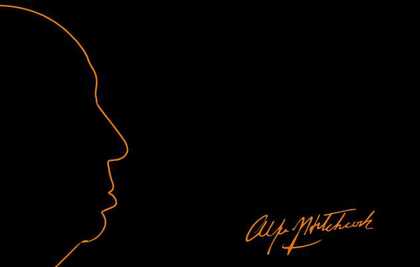
We are all born into the world under the power of darkness. Just as we are by nature, we tend to live in this world. That is why we rarely think about God. We are unaware that we are walking in darkness. These things do not interest us and we believe that they do not affect us, although what we do shows that they do.
TRANSFERING THE BLAME
The Jesuits say: “give me the child for his first seven years, and I will give you the man”. Another version of the same sentence adds: “no matter who will have him afterwards”. So even though Hitchcock told Bogdanovich that he had “grown out of religious fear”, the psychological complexity of his characters continues to be marked by the reality of guilt. A recurrent theme in his films is the innocent person, who is accused of a crime that he did not commit. Critics call this the transfer of guilt.
In a way, that is how the Gospel presents Jesus to us: as an innocent victim, who is falsely accused, burdened with the sins of the world. The difference, of course, is that he doesn’t have a dark side like us. In his light, there are no shadows (1 John 1:5). “This is the verdict: Light has come into the world, but people loved darkness instead of light because their deeds were evil.” (John 3:19).
The Truth of Christ lights up the deepest darkest corners of our soul, bringing to light anything evil. It is when we discover that “There is no one righteous, not even one;” (Romans 3:10), that we understand that Jesus came “to save the lost”. On his cross a “transfer of guilt” took place, whereby his justice became our own. In that exchange, he rescued us from the power of darkness.
The blood of Jesus manifests the justice that frees us from the triviality of evil (Romans 3:25). Because He died on that cross, we discover that evil will not be without consequences. If our hope is in Christ, He died in our place and rose again for our justification, “so as to be just and the one who justifies those who have faith in Jesus.” (v. 26). His blood washes us of all evil.
Published in: Evangelical Focus - Between the Lines - Hitchcock and the trivialization of evil
